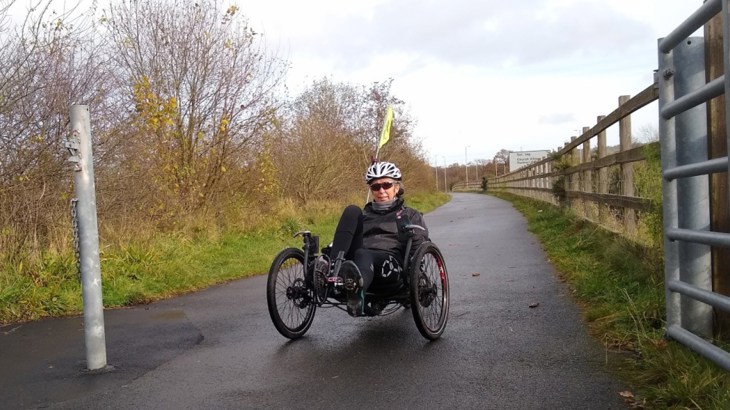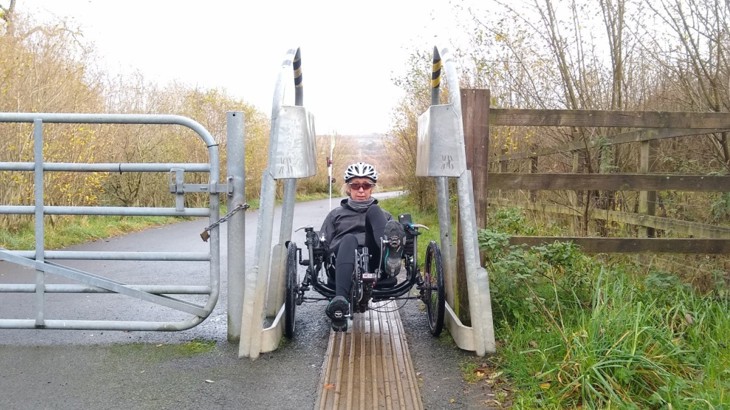At the peak of her fitness, Amanda Harris had a life-changing accident in 2014 that injured her spinal cord. Wanting to continue getting outdoors and cycling, she started using an Ice Trike. Here, she shares her inspirational story and explains how access barriers on walking and cycling routes affect her ability to cycle independently.
Amanda Harris shares her story about how access barriers on walking and cycling paths affect her ability to cycle independently.
I always enjoyed cycling but a busy family and work-life often got in the way of me taking it up as a regular pastime.
When I turned 40 however I decided I needed to take on a personal physical challenge.
So I signed up to cycle the Copper Coast in Southern Ireland to raise money for charity.
I invested in a road bike and spent many hours pedalling around South Wales gradually increasing my mileage and my fitness in readiness for the challenge.
I was surprised how much I enjoyed it.
It's a great escape from real-life worries, a chance to meet and natter with fellow riders and a fabulous way to explore the great outdoors.
A life-changing accident
One year later, however, in 2014, just as I felt I was at the peak of my fitness, my life changed quite dramatically.
During a ride with friends, I was thrown off my bike at speed and ended up being rushed to hospital having landed nastily on my back.
I had broken vertebrae and, most significantly, damaged my spinal cord.
Emergency spinal surgery and seven months in a spinal injury rehabilitation unit followed.
Unfortunately, the injuries I had sustained were life-changing and I had, overnight, become paraplegic.
Life on crutches and a wheelchair lay ahead and it’s fair to say I was absolutely devastated.
Despite strenuous physio, my injury has left me with paralysis in my right leg, ankle, foot and hip flexor.
I also have partial paralysis in my lower right stomach.
All of which means that balancing and pedalling an upright, regular, two-wheeled bike is, at least for now, out of the question.
Support from family and friends to get back outdoors
After my accident, my family and friends were a great support.
They knew it was crucial for my recovery that I found a way to continue to ride and get outdoors.
So, with fundraising from my local cycle club, together with advice from Cardiff Pedal Power and Freetrike Rehab Cycling, I was lucky enough to purchase a recumbent Ice Trike.
The trike had the stability I needed and allowed me to pedal by strapping my right leg onto the pedal with my left leg essentially powering my right one around.
Since buying the trike, I haven’t looked back.
I am back riding around my local area and participating in charity events.
I am also a member of the Morrello Marvels para-cycling club which aims to break down barriers and support people who are living with a neurological condition to live a healthy life.

"My family and friends were a great support. They knew it was crucial for my recovery that I found a way to continue to ride and get outdoors."
My injury has opened up many new doors for me.
I’ve become a trustee of a spinal injury charity and helped to organise an annual accessible cycling event.
And I've cycled more miles on my trike than I ever did on 2 wheels. I’ve also met some incredible people on the way.
Living with a disability
It's true however that living with a disability is hugely frustrating.
I have always been fiercely independent. And I find it very hard to now have to ask for help to do simple tasks – opening doors, getting down curbs in my wheelchair, carrying things, pushing up hills.
Cycling, however, gives me a feeling of freedom and independence once again.
It gives me the ability to ride alongside family and friends, a chance to gather some speed (in an otherwise sedentary life), go where I want, and set myself some personal goals.
The ability to go out and exercise on my own, when I want, on my own terms, without having to rely on someone else is just priceless.
The frustration of access barriers
Imagine the frustration therefore when, out on my own, I come across a heavy gate on a bike path or a pesky metal hairpin type barrier.
Or a couple of steps, or a narrow gateway that the front wheels on my trike won’t fit through.
These types of barriers, whilst I wouldn’t have given any thought to them pre-injury, now cause me and many others huge frustration and, at times, have even brought me to tears.
Not being able to get through and having to wait for a stranger to come and help, sometimes in quite isolated areas, just serves to remind me of my disability and even my vulnerability.
I am not able to get off my bike and push or carry it over any barrier.
I need crutches and an orthotic foot splint before I can even attempt to walk and these are not things I can carry on my rides.
The same frustration comes from parts of cycle paths that are marked ‘cyclists dismount’.
Put simply, I would if I could, but I can’t.
My trike serves not only as a leisure or physio tool but also, perhaps most significantly, as a mobility aid.
I cannot walk unaided but I can cycle.

"Whilst I wouldn’t have given any thought to these barriers pre-injury, they now cause me and many others huge frustration and, at times, have even brought me to tears."
Cycling in my local area
I live in an area which is very popular with road cyclists – linking Cardiff, the Valleys and the Vale.
I do ride on the road with friends but given I am low to the ground and less visible than this is not something I feel safe to do solo.
If I ride on my own I, therefore, choose to ride on bike paths.
I am lucky that Rhondda Cynon Taf has a network of paths, a number of which are barrier-free.
Apart from a short on-road section from my house, I believe that I can now connect up to the Taff Trail and ride all the way down to Cardiff Bay or up to Pontypridd if I chose to do so.
Worry-free riding
Knowing there is a traffic-free and barrier-free path means myself and members of my para-cycling club can have a worry-free ride.
No need to spend huge amounts of time researching routes.
And we don't have to send regular cyclists out to check the area – a job that only serves once again to make us feel somehow different to others who can just get on their bike and go.
We teamed up with Open Country to talk about cycling with a disability and get their tips on overcoming some of the barriers that people can face. Take a look at the list of tips and guidance.
Find out why cycling and walking are great for your mental health.

We're working to remove or redesign barriers on our land
Barriers on the Network are restricting many people from accessing the Network and enjoying its benefits.
With your support for our Raise the Bar appeal, we can work towards removing or redesigning barriers on our own land, to create a Network for everyone.





